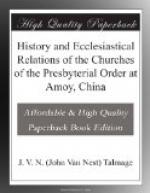The church grew, and in due time a Consistory was called for; must the work stop, because the Constitution had made no provision? No. The little church had the right to choose men, and having chosen suitable men, it was our duty to ordain them. The authority we thus exercised was not usurped, but was implied in the commission we received from our Master through the Church. The same may be said of the authority of the brethren at Amoy, when, in connection with the representative elders of the various churches, they proceeded to the ordination of native pastors, and the organization of new churches. It was not necessary for the performance of every act to get a new commission from the Church. When the Church sent us out, the one commission contained all the authority necessary for the complete organization of the church. It is an absurdity to deny, on constitutional grounds, the right of the Missionaries to perform these last acts unless you deny their right to perform all their other acts except the simple preaching of the Gospel. Their acts were all extra, not contra constitutional. If their authority thus to act be justified in reference to the former acts, and denied in reference to the latter, the justification and denial must be on other grounds than the Constitution of our Church.
Will any one assert that the Classis thus formed at Amoy is not a Classis de facto? or that the native pastors ordained and installed by that body are not scripturally set apart to their offices, and that its other acts are null and void? If so, then, as yet, there are no organized churches—no Consistories—at Amoy, and there have been no scriptural baptisms, for all ecclesiastical acts performed there, have been performed on the same principles, and by the same authority. No one will have the hardihood to assert such a doctrine. It will be admitted that there is a Classis de facto at Amoy. Then it is competent to perform all the functions of a Classis. But it will not be contended that that Classis is a part of the Dutch Church in America. Yet it is essentially like a Classis in America, just so far as the present state of development of the Church at Amoy, and its Chinese character, render likeness possible. It is Chinese, not American. The organization of such a Church is what we always supposed required of us. We never imagined that we were sent to organize the American Dutch Church in China. If your Missionaries are allowed to proceed, and are not required to repel the English Presbyterian brethren from their united labors with us, there will be but one Church at Amoy of the Presbyterian order. With the continued blessing of God on such harmonious labor, it will be the Church of that region. It will be dear to both the Presbyterian Church in England, and to our Church in this land, and peculiarly dear to our Church in this country, because of its Dutch characteristics. Your Missionaries




